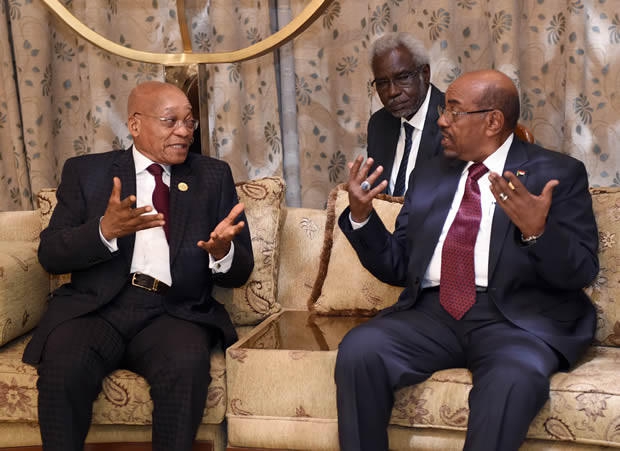In a recent article, JusticeInfo editorial advisor Pierre Hazan looked at the African assault on the International Criminal Court and what it means for the ICC’s legitimacy. Hazan concludes that despite its inherent and ongoing weaknesses, the ICC is vital for the worldwide fight against impunity. In this opinion piece, the authors argue that “the ICC seems more like the breaker of the march against impunity than its maker”. We are also publishing Hazan’s counter-argument in this debate, For the Independence of the ICC
In his recent article “Good and Bad Reasons for Africa’s Assault on the ICC”, Pierre Hazan artfully reconstructed the road that led to the current rift between the ICC and the African Union (AU), which recently adopted a unanimous call for a road map towards the complete withdrawal of its member-states from the Rome Statute. As Hazan rightfully fears, such a scenario could well amount to a diplomatic “kiss of death” for the ICC. With roughly a third of its Assembly of States Parties (members) being African, such a withdrawal would torpedo any legitimacy this Court still retains. The fact that three of the five permanent members of the UN Security Council (the US, Russia, and China) are not members of the Rome Statute (ICC founding treaty) speaks much of its weakness. The fact that the UN Security Council has referred cases to the ICC (most notably Sudan’s Omar Al Bashir) whilst three of its five permanent members have expressed a de facto vote of no-confidence in this Court says it all. In his conclusion, Hazan maintains that despite all its shortcomings, the ICC has “created a new norm in international law”, namely the rejection of impunity.
There can be little doubt that “world public opinion” (whatever that term may imply) has shifted radically away from the implicit acceptance of impunity so prevalent during the 1960s and 70s. The question is not so much if we are less prone to impunity, but rather who is to be credited for this new zeitgeist? If anything, it seems to the writers of these lines that the ICC has been more of a harm-doer to this new zeitgeist than its creator. If credits are due in this regard, they are to be given to the whole range of transitional justice tools and mechanisms, from the fact-finding commissions of the 1980s and early 90s in Latin America to the South African TRC and ultimately the two UN tribunals, the ICTY and the ICTR. Against this backdrop, the ICC seems more like the breaker of the march against impunity than its maker. As Hazan observed, “the heart of the problem lies in the very political strategy of the Prosecutor ever since the Court was born in 2002”. And it is here, in the ICC Prosecutor’s prerogative to launch an investigation on his own initiative without referral from any UN organ, that the problem inherently lies.
THE ICC, THE BREAKER OF THE MARCH AGAINST IMPUNITY
Article 15 (1) of the Rome Statute says that: “The Prosecutor may initiate investigations proprio motu on the basis of information on crimes within the jurisdiction of the Court”. During the negotiations over the Rome Statutes, this independence for the ICC Prosecutor was deeply contested by the US, China, India and other countries. The US insisted that if it were to be part of the Rome Statute, this proprio motu (Latin for “on his own accord”) principle had to be struck out of the Statute. When it was ultimately decided that Article 15 (1) would stay, the US walked out.
There are some deep historical ironies associated with the concept of proprio motu, as well as with the ultimate consequences it had within legal systems in the past. One of the first known usages of this principle can be found in the actions of Tiberius Gracchus (133 BC). Attempting to implement his social laws for the redistribution of land, and with the Roman treasury being blocked by the Senate, Gracchus seized public funds on his own initiative and without the Senate’s approval (proprio motu), so as to execute his land reform. Both historians of antiquity (Plutarch) and modern historians (such as H.H. Scullard) have pointed to Tiberius Gracchus’s individualistic mode of action as the defining moment when the collapse of the Roman republic began. The clerical antecedents of proprio motu are not any less telling. A motion put forward by the Pope proprio motu (such as changes in Canonical legislation or the creation of institutions) does not require a Cardinals’ quorum, nor can it be revoked, even if its legal grounds subsequently turn out to be flawed or erroneous. It is worth noting here that the first Pope to ever resort to the use of proprio motu was Innocent VIII (1483-1492), one of the most corrupt Popes ever to sit on the Holy See. Some 20 years after his death, Luther posted his 95 theses on the Wittenberg Cathedral door, triggering the Protestant Reformation.
THE ICC SHOULD BE SUBORDINATED TO THE SECURITY COUNCIL
The entire debate boils down to the question of the ICC’s judicial independence. Proponents of this independence (such as Hazan) wish to see an ICC which is independent of the UN Security Council, one which could be true and unbiased as would be expected of any good and sound judiciary. The weakness of this argument lies, however, in that it confuses the principles of International Law with those of Domestic Law. The principle of an independent judiciary stems from the separation of powers between the Executive, Legislative, and Judicial arms of the State, as advocated by the French political philosopher Montesquieu. Yet the international system does not have any such separation – since it is missing vital components of the Montesquieu system. First it does not have a legislator. As Carr rightfully observed as early as 1939, international law is handicapped since it is based solely on custom (Traités Lois) and is devoid of a real legislator with sanctioning and coercive powers, as per all domestic Parliaments. But it is Carr’s second observation which is the more fundamental to the fallacy of the ICC’s independence, namely the illusion that one can avoid the element of power in its proceedings. The fundamental axiomatic assumption we all subscribe to is that our judiciaries are hopefully the only place where Justice-based logic overrides power considerations. Therein lies the intellectual brilliance of Montesquieu’s system.
Yet so long as we do not have one such fully functional system, we are doomed to live with power as an integral part of our workings in international relations, and even more so in international law. This understanding lay at the basis of the International Court of Justice Statute and the UN Charter (Art. 94) which in effect subordinated the ICJ World Court to the mechanics of power relations, namely to the UN Security Council. This was in direct contrast to the ethos that prevailed (and completely destroyed!) the League of Nations, in the era when Wilson and his followers naïvely thought that Law and justiciable disputes could solve political (that is power-based) problems. The roots of the ICC’s current problems are to be found back in the 1990s when the Rome Statute was drawn up and the independence of the ICC Prosecutor under Article 15 (1) was granted. As Chekov so famously said: “A gun we see on stage in the first Act will fire in the third”.






